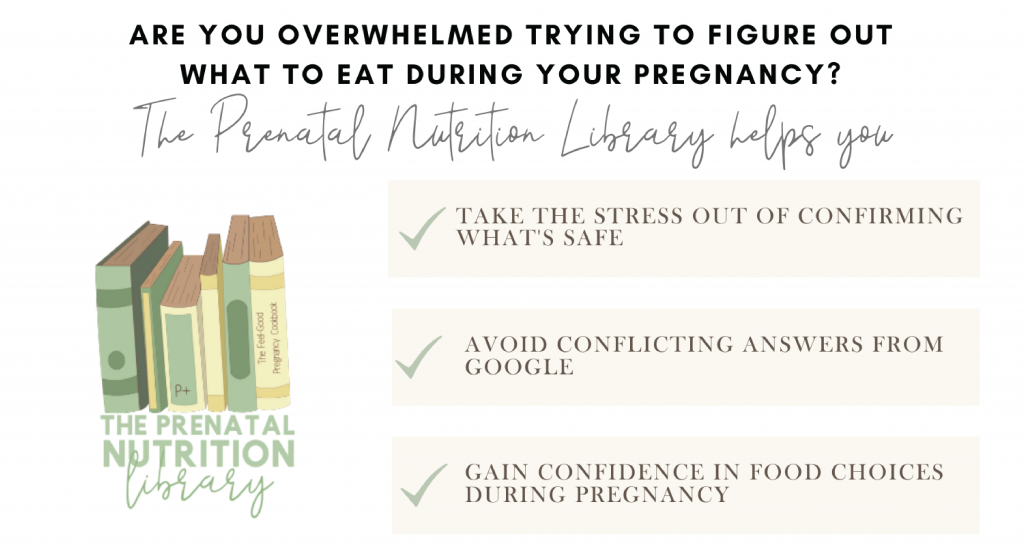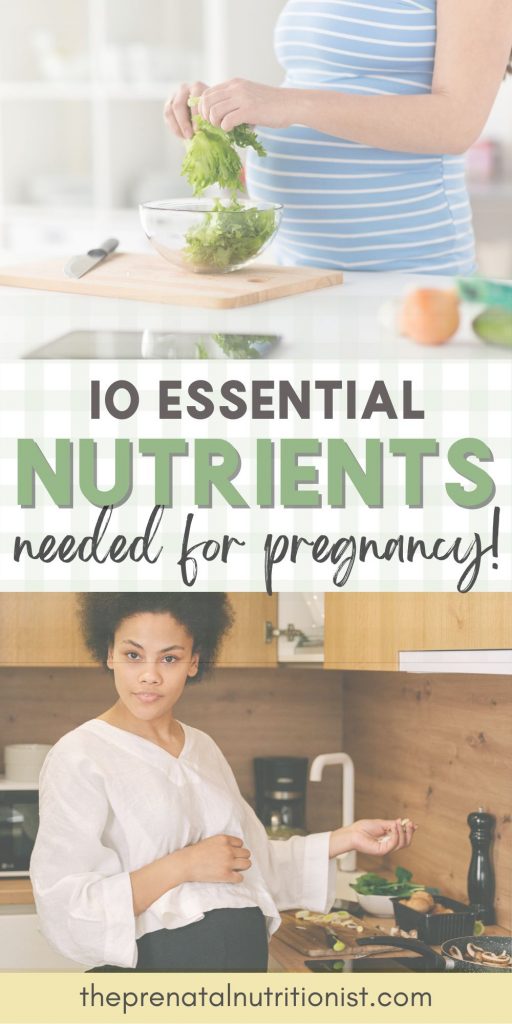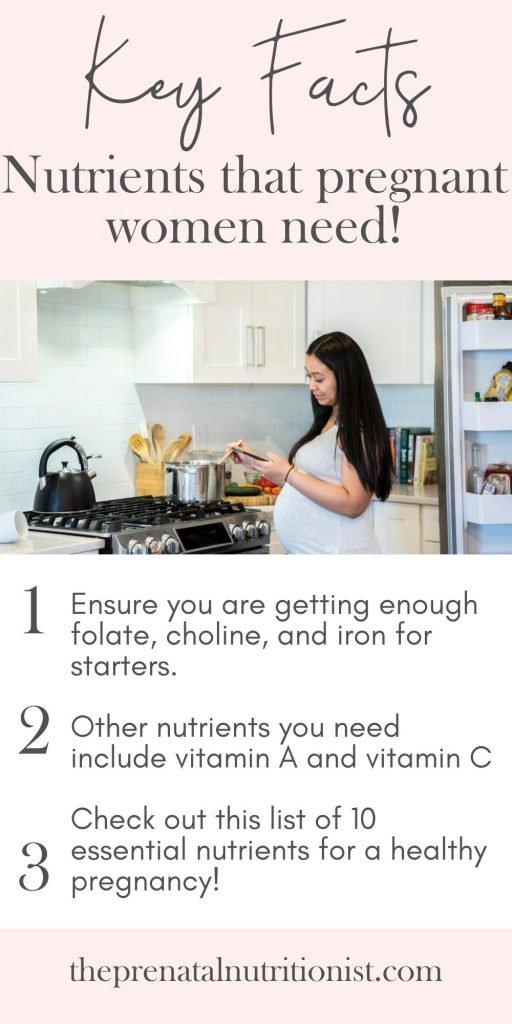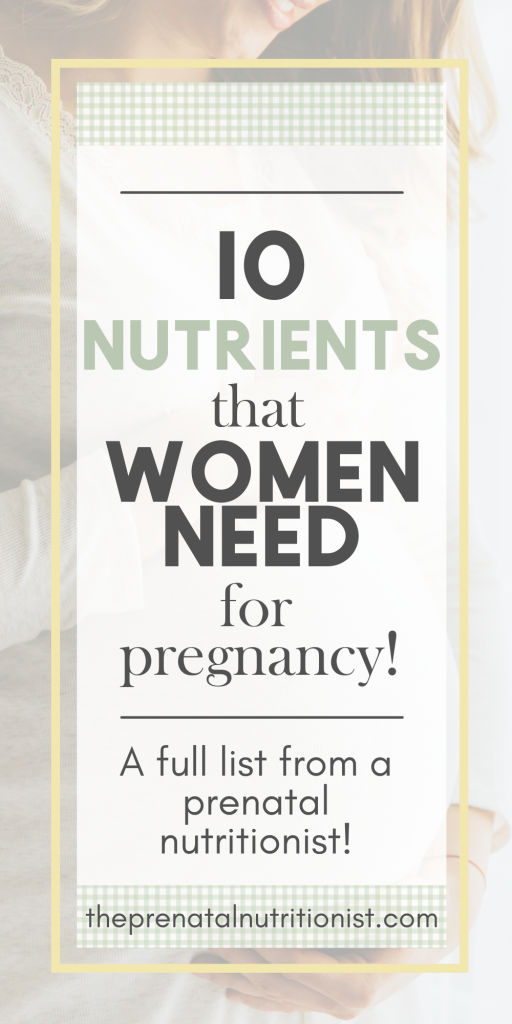
10 Nutrients That Pregnant Women Need
Pregnancy is a unique and exciting time in a woman’s life. Many changes happen during pregnancy, including the body’s demand for more nutrients to support the mom and the growing baby’s needs.
It is important pregnant women meet nutrient needs and prevent deficiencies during pregnancy. Today we are reviewing ten non-negotiable nutrients to support a growing baby. And equally as necessary, to support expecting mothers as they go through the many changes associated with pregnancy.
So today, we’re sharing a roundup of these specific nutrients and where to get them. Let’s go!
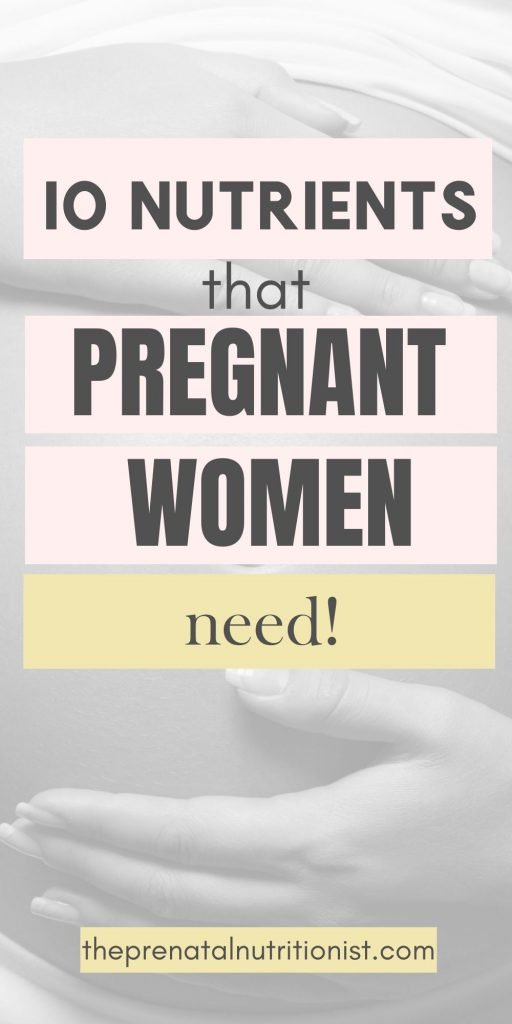
10 Nutrients That Pregnant Women Need
Folate
Consuming plenty of folate during pregnancy is vital for two main reasons. First, it supports the overall growth of the fetus and the placenta. And second, it reduces the risk of congenital disabilities – specifically neural tube defects in the baby’s brain and spine.
Pregnant women should consume 600 micrograms of folate each day. Most women supplement their folate intake with a prenatal vitamin, typically containing around 400 micrograms or more folate. The rest you can get from a balanced diet!
Good Sources of Folate:
- Lentils
- Oranges
- Avocado
Calcium
Calcium is essential during pregnancy to promote the strong development of the baby’s bones and teeth. Having adequate amounts of calcium in the diet has been shown to reduce the risk of high blood pressure (and preeclampsia) for pregnant people.
Pregnant people aged 14-18 should strive to consume 1,300 mg of calcium daily, while pregnant people ages 19 and older should consume around 1,000 mg daily. The same is needed for non-pregnant individuals.
Good Sources of Calcium:
- Dark leafy greens
- Sardines
- Yogurt
Iron
During pregnancy, the body is tasked with creating more red blood cells. This creates more demand for iron. Iron is critical for your baby’s development and your placenta’s function.
Iron is an essential nutrient, meaning the body doesn’t create iron; we must consume it from our diets through food, supplements, or both. Iron deficiencies are common during pregnancy. Pregnant women should aim to consume at least 27 milligrams of iron daily. By incorporating some of these iron-rich recipes, ensure you’re consuming plenty of iron!
Good Sources of Iron:
- Red meat
- Cooked shellfish
- Lentils and other vegetarian sources (non-heme iron)
Iodine
Iodine is a mineral essential for your thyroid’s health and functions. Your thyroid produces hormones involved in many vital processes in the body. This mineral is necessary for regulating the body’s metabolism and, by doing so, helps expecting mothers maintain a healthy weight gain. For babies, iodine is a crucial nutrient required for the proper development of the brain.
Expectant mothers should consume 220 micrograms of iodine each day. Luckily, plenty of iodine-rich foods are out there, and iodine deficiencies are much less common than other deficiencies, such as iron. Click here for a list of foods that promote a baby’s brain development!
Good Sources of Iodine:
- Dairy products
- Seafood
- Iodized table salt
Choline
Choline directly supports the proper growth and development of a baby’s brain, specifically the memory portion of the brain. Research has shown that adequate choline consumption during pregnancy may enhance memory for life – wow! And for expecting mothers specifically, choline helps regulate mood and may reduce the risk of preeclampsia—more on choline here.
Pregnant women should consume at least 450 milligrams of choline each day. Like iron, choline is not produced organically in the body, so it must be obtained through food. This nutrient is also not found in all prenatal vitamins, making it even more critical to ensure you consume choline-rich foods and choose a high-quality, well-rounded prenatal vitamin.
Good Sources of Choline:
- Beef
- Egg yolks
- Salmon
Vitamin A
Vitamin A serves several purposes during pregnancy. Most well-known, it promotes proper skin and eyesight development for a baby. It also assists in forming the baby’s bones and supports the proper immune function for both mother and baby.
Pregnant people ages 14-18 should consume around 750 micrograms of vitamin A daily. The recommendation for pregnant people 18 and up is 770 micrograms/day. This vitamin is found in plenty of common foods, making deficiencies rare but not obsolete. You must consume both types of vitamin A, preformed, and provitamin A (or retinol). Most people know preformed vitamin A in the form of beta-carotene.
Good Sources of Vitamin A:
- Carrots (beta-carotene)
- Eggs (retinol)
- Sweet potatoes (beta-carotene)
- Yogurt (retinol)
Vitamin C
Vitamin C is another nutrient that plays various roles throughout the body. This vitamin is essential for bone development, skin health, iron absorption, and a healthy immune system. For expecting mothers, vitamin C supports collagen production and birth weight and length. But also of great importance, it supports healthy blood pressure levels.
Pregnant women aged 14-18 should consume 80 milligrams of vitamin C daily. Those 18 and above should consume 85 milligrams/per day. Vitamin C is present in many fruits and vegetables. So, eating a balanced diet is the best way to ensure you consume an adequate amount of this vitamin.
Good Sources of Vitamin C:
- Broccoli
- Bell peppers
- Oranges
Vitamin D
Vitamin D is essential during pregnancy. Preventing vitamin D deficiency helps to reduce the risk of unwanted pregnancy outcomes, such as gestational diabetes, preeclampsia, gallbladder issues, and miscarriage in the first trimester. This vitamin is also crucial for developing a baby’s bones, teeth, and immune function. (If you are dealing with gestational diabetes, try these GD-friendly snacks!)
Expectant mothers should consume 600 international units of vitamin D daily, although more may be warranted or needed in many cases. Vitamin D is one of the most interesting vitamins because it’s the only one we can absorb from the sun.
Depending on your location, getting the vitamin D, you need daily with just 15 minutes of sun exposure is possible. You’ll have to stick to food sources if there’s no sunshine at the correct latitude.
Good Sources of Vitamin D:
- Sunlight
- Fatty fish (salmon, sardines)
- Egg yolk
Vitamin B6
Vitamin B6 is important for expecting mothers because it helps regulate energy use (proteins, fats, and carbohydrates). Without plenty of vitamin B6, typical pregnancy symptoms such as tiredness, fatigue, and brain fog could be exacerbated. Vitamin B6 is also essential for forming red blood cells and, thus, the overall health of the fetus.
Expecting mothers should consume 1.9 milligrams of vitamin B6/day. While this vitamin is found mainly in meat products, vegetation alternatives exist. The best way to ensure you’re consuming enough vitamin B6 is to eat a healthy diet of fruits and vegetables.
Good Sources of Vitamin B6:
- Salmon
- Chicken
- Chickpeas
- Spinach
- Bananas
Vitamin B12
Vitamin B12, also known as cobalamin, helps us feel energized throughout the day. Things like tiredness and brain fog may worsen without an adequate amount of this vitamin. For babies, vitamin B12 helps ensure the proper development and functioning of the nervous system. As well as assisting the body with creating new red blood cells.
This vitamin is only found naturally in animal products. So, if you’re vegan or vegetarian, it’s recommended that you take a prenatal vitamin that includes a lot of vitamin B12. As always, before starting any new supplement, be sure to speak to your healthcare provider first. It is also wise to get your B12 levels checked, as supplements don’t always work.
Good Sources of Vitamin B12:
- Beef
- Cooked oysters
- Yogurt
A happy and healthy pregnancy starts with making sure you’re consuming these ten essential nutrients!
Other than these ten essential nutrients, it’s also crucial for pregnant women to consume plenty of protein, omega-3s, complex carbohydrates (fiber), and more. All of these can easily be accomplished by maintaining a balanced diet throughout the pregnancy with foods from all the food groups. For more nutritious foods you can eat during pregnancy, see this post on Is Asparagus Good For Pregnancy HERE!
For more blogs like this one, head on over to our blog. Are you looking for some easy and delicious recipes that include these nutrients?? You can gain access TODAY to the most comprehensive library of prenatal information and expert-crafted meal plans by signing up for The Prenatal Nutrition Library!
